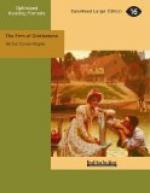And now the time was coming when it was to be decided whether, by a last bold stroke, the credit of the House of Girdlestone was to be saved, or whether the attempt was to plunge them into deeper and more hopeless ruin. An unscrupulous agent named Langworthy had, as already indicated, been despatched to Russia well primed with instructions as to what to do and how to do it. He had been in the employ of an English corn merchant at Odessa, and had some knowledge of the Russian language which would be invaluable to him in his undertaking. In the character of an English gentleman of scientific tastes he was to establish himself in some convenient village among the Ural Mountains. There he was to remain some little time, so as to arouse confidence in the people before making his pretended discovery. He was then to carry his rough diamonds to Tobolsk, as the nearest large town, and to exhibit them there, backing up his assertion by the evidence of villagers who had seen him dig them up. The Girdlestones knew that that alone would be sufficient when telegraphed to England to produce a panic in the sensitive diamond market. Before any systematic inquiry could be made, Langworthy would have disappeared, and their little speculation would have come off. After that the sooner the people realized that it was a hoax the better for the conspirators. In any case, there seemed to be no possibility that the origin of the rumour could be traced. Meanwhile, Ezra Girdlestone had secured his passage in the Cape mail steamer Cyprian. On the night that he left he sat up late in the library at Eccleston Square talking over the matter for the last time with his father.
The old man was pale and nervous. The one weak point in his character was his affection for his son, an affection which he strove to hide under an austere manner, but which was none the less genuine. He had never before parted with him for any length of time, and he felt the wrench keenly. As to Ezra, he was flushed and excited at the thought of the new scenes which lay before him and the daring speculation in which he was about to embark. He flung himself into a chair and stretched his thick, muscular limbs out in front of him.
“I know as much about stones,” he said exultantly, “as any man in London. I was pricing a bag of rough ones at Van Helmer’s to-day, and he is reckoned a good judge. He said that no expert could have done it better. Lord bless you! pure or splints, or cracked, or off colour, or spotted, or twin stones, I’m up to them all. I wasn’t a pound out in the market value of any one of them.”
“You deserve great credit for your quickness and perseverance,” replied his father. “Your knowledge will be invaluable to you when you are at the fields. Be careful of yourself when you are there, my son, if only for my sake. There are rough fellows at such places, and you must give them soft words. I know that your temper is quick, but remember those wise words, ’He that ruleth his spirit is better than he that taketh a city.’”




